doing用法大全
37个动词doing句型

37个动词doing句型1. keep doing坚持做某事2. keep sb. doing使某人一直做某事3. practise doing sth.练习做某事4. enjoy doing 喜欢做某事5. finish doing完成做某事6. be afraid of doing害怕做某事be busy doing 忙于做某事7. look forward to doing盼望做某事8. how about doing/what about doing做某事怎么样9. spend some time (in) doing花时间做某事10. spend some money (in) buying 花钱做某事11. feel like doing想做某事12. stop/keep/prevent .. from doing阻止某人做某事13. thank sb for doing 感谢某人做某事14. thanks for doing 感谢做某事15. do some cooking/cleaning/reading/shopping/washing做点饭、打扫一下卫生、读点书、逛逛街、洗洗衣服16. go swimming/fishing/shopping/skating/boating去游泳、钓鱼、逛街、滑冰、划船17. mind doing介意做某事18. can' t help doing情不自禁做某事19. consider doing考虑做某事20. have fun doing sth.. 做某事有趣21. have difficulty doing sth做某事有困难have trouble doing sth做某事有困难have problem, doing sth 做某事有困难22. waste time/money doing浪费时间或金钱做某事23. instead of doing代替做某事24. miss doing 错过做某事25. hold on to doing坚持做某事26. pay attention to doing 集中精力做某事27. suggest doing建议做某事28.It's time for doing到该做某事的时间了It's time to do sth. 到该做某事的时间了29. There is sb doing sth有人正在做某事30. be used to doing sth习惯做某事31. be used for doing sth被用来做某事32. have a lot of experience具有做某事的丰富经验33 sb allow doing sth允许做某事34. put off doing sth推迟做某事35. succeed in doing sth 成功做某事36. end up doing以做某事结束37. give up doing放弃做某事。
Do、To do、Doing 的用法

Do/To do/Doing 的用法1.+ to do=+ doing:开始做某事begin to do/doing =start to do / doing 不喜欢dislike to do / doing 憎恨做某事hate to do/ doing喜欢做某事like / love to do / doing2.+ to do≠+ doing:忘记去做某事forget to do忘记已经做过某事forget doing记住去做某事(未做)remember to do记得已经做过某事remember doing 继续另一件事go on to do继续做原来的事go on doing 停下来去做某事stop to do 停止做某事stop doing 努力做某事try to do试着做某事try doing悔恨没做某事regret to do 后悔已做某事regret doing3.+ do帮助做某事help (to) do宁愿(不)做某事would rather (not) do最好(不)做某事had better (not) do4.+ doing:完成做某事finish doing喜欢做某事enjoy doing一直做某事keep doing练习做某事practise doing考虑做某事consider doing坚持做某事insist on / upon doing避免做某事avoid doing建议做某事suggest doing错过做某事miss doing想象做某事imagine doing介意做某事mind doing忍不住做某事can’t help doing坚持做某事keep on/ carry on doing成功做某事succeed/ be successful in doing 忙于做某事be busy (in) doing…怎么样? What /How about doing?对做某事感兴趣be interested in doing 因某事谢谢某人thank you for doing(非常)值得被…be (well) worth doing因为…because of doing而不是instead of doing(没)有做某事without/ with doing通过做某事by doing sth担心做某事worry about doing害怕做某事be afraid of doing放弃做某事give up doing做某事有麻烦have trouble / problems /difficulty (in) doing做某事开心have fun/ a good time/enjoy oneself (in) doing浪费时间做某事lose/waste time (in) doing sth 将某人的精力投入到…put one’s effort into doing 某人花费时/钱做某事sb spend +时间/钱(in) doing梦想做某事dream of/about doing5.+to do :选择做某事choose to do拒绝做某事refuse to do需要做某事need to do=require to do迫不及待做某事can’t wait to do准备做某事prepare to do=be ready to do 计划做某事plan to do决定做某事decide to do = make a decision to do = make up one’s mind(s) to do学习learn to do继续做某事continue to do付得起做某事afford to do 似乎做某事seem to do过去常常做某事used to do敢做某事dare to do梦见做某事dream to do碰巧做某事happen to do想做某事would like to do = want to do 别无选择做某事have no choice but to do 同意做某事agree to do希望做某事hope to do希望做某事wish to do不得不做某事have to do做某事失败fail to do答应做某事promise to do逐步做某事get to do更喜欢做某事prefer to do设法做某事manage to do应该做某事ought to do主动做某事offer to do尽某人最大努力做某事try/ do one’s best to do 采取措施做某事take action(s)/steps to do 等着轮到某人做某事wait for one’s turn to do轮流做某事take one’s turn to do有机会做某事have a chance to do没有时间做某事have no time to do与…比起来宁愿做某事prefer to do rather than do =would rather do than do足够…做某事enough+n.+ to do ,adj./adv.+enough+ to do为了… to do = in order to do= so as to do=for doing6.to doing :盼望做某事look forward to doing 习惯于做某事be used to doing 致力于做某事devote …to doing 与…比起来宁愿做某事prefer doing to doing 对…做出贡献make contribution(s) to doing 导致lead to donig7. sb to do :命令某人做某事order sb to do答应某人做某事promise sb to do邀请某人做某事invite sb to do警告某人(不)做某事warn sb (not) to do请求某人(不)做某事ask sb (not ) to do吩咐某人(不)做某事tell sb (not) to do想要某人(不)做某事would like sb(not) to do 需要某人做某事need /require sb (not) to do 鼓励某人做某事encourage sb to do使用某人做某事use sth to do教某人做某事teach sb to do 导致某人做某事cause sb to do训练某人做某事train sb to do建议某人做某事advise sb to do允许某人做某事allow sb to do希望某人做某事wish sb to do让某人做木事get sb to do提醒某人做某事remind sb to do拒绝某人做某事refuse sb to do迫使某人做某事force sb to do (agree sb to do是错的,hope sb to do 是错的)8.sb doing:使某人一直做某事keep sb doing sth 介意某人做某事mind sb/ sb’s doing 阻止某人做某事prevent /stop sb (from )doing = keep sb from doing 发现某人正在做某事find sb doing9.sb do/doing看见某人做某事see sb do/ doing 观看某人做某事watch sb do/ doing 听见某人做某事hear sb do/ doing 注意某人做某事notice sb do/ doing(句中有表示时点的词用doing, 有表示频度和感情的词用do)10.sb do:使某人做某事make sb do 让某人做某事let/have sb do帮助某人做某事help sb do = help sb to do11.关于to do/doing/do的句型(1)做某事花费某人…It takes /took+sb+ 时间+ to do (2)做某事对某人而言是…的It’s + adj. for sb/ of sb to do (3)做某事对某人而言是一个遗憾It’s a pity for sb to do(4)是某人第一次做某事It’s one’s first time to do(5)到了(某人)做某事的时候了。
doing的四种用法

doing的四种用法1)表示进行中的动作:"Doing"作为动词的进行时形式,表示目前正在进行的动作。
例如:"He is doing his homework." (他正在做作业。
) 这句话中的"doing"指的是"do"这个动作正在进行中。
2)表示经常性的或习惯性的动作:"Doing"还可以表示常态或习惯性的动作。
例如:"She is always doing her best in everything she does." (她总是在做任何事情时都尽最大努力。
) 这句话中的"doing"表示她习惯性地对任何事情都全力以赴。
3)表示做其中一种活动或职业:"Doing"也可以指一个人正在从事或从事其中一种活动或职业。
例如:"What is he doing now?" (他现在在干什么?) 这句话中的"doing"表示他当前正在从事项活动。
4)表示替代一些动词:在一些情况下,"doing"还可以用来替代一些动词的名词形式,以强调正在进行的动作。
例如:"I love swimming, but today I'm tootired to do any exercise." (我喜欢游泳,但今天我太累了,没力气做运动。
) 这句话中的"do any exercise"中的"do"之所以用"doing"替代,是因为它代指的是运动这个动作。
总之,"doing"作为动词的进行时形式,可以表示进行中的动作、经常性的习惯动作、正在从事的活动或职业,并且可以替代一些动词的名词形式以强调正在进行的动作。
doing的用法总结
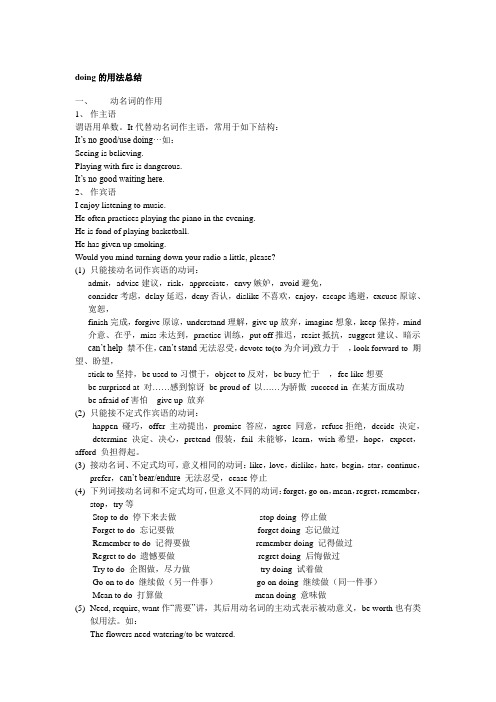
doing的用法总结一、动名词的作用1、作主语谓语用单数。
It代替动名词作主语,常用于如下结构:It’s no good/use doing···如:Seeing is believing.Playing with fire is dangerous.It’s no good waiting here.2、作宾语I enjoy listening to music.He often practices playing the piano in the evening.He is fond of playing basketball.He has given up smoking.Would you mind turning down your radio a little, please?(1)只能接动名词作宾语的动词:admit,advise建议,risk,appreciate,envy嫉妒,avoid避免,consider考虑,delay延迟,deny否认,dislike不喜欢,enjoy,escape逃避,excuse原谅、宽恕,finish完成,forgive原谅,understand理解,give up放弃,imagine想象,keep保持,mind 介意、在乎,miss未达到,practise训练,put off推迟,resist抵抗,suggest建议、暗示can’t help 禁不住,can’t stand无法忍受,devote to(to为介词)致力于···,look forward to 期望、盼望,stick to坚持,be used to习惯于,object to反对,be busy忙于···,fee like想要···be surprised at 对……感到惊讶be proud of 以……为骄傲succeed in 在某方面成功be afraid of害怕give up 放弃(2)只能接不定式作宾语的动词:happen 碰巧,offer 主动提出,promise 答应,agree 同意,refuse拒绝,decide 决定,determine 决定、决心,pretend 假装,fail 未能够,learn,wish希望,hope,expect,afford 负担得起。
doing放句首的用法
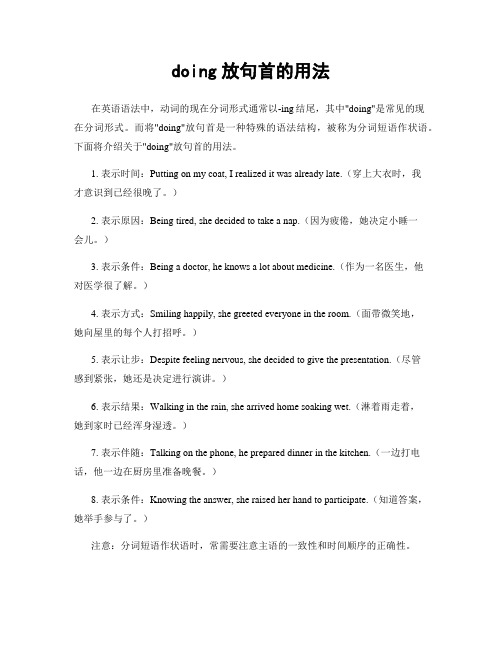
doing放句首的用法在英语语法中,动词的现在分词形式通常以-ing结尾,其中"doing"是常见的现在分词形式。
而将"doing"放句首是一种特殊的语法结构,被称为分词短语作状语。
下面将介绍关于"doing"放句首的用法。
1. 表示时间:Putting on my coat, I realized it was already late.(穿上大衣时,我才意识到已经很晚了。
)2. 表示原因:Being tired, she decided to take a nap.(因为疲倦,她决定小睡一会儿。
)3. 表示条件:Being a doctor, he knows a lot about medicine.(作为一名医生,他对医学很了解。
)4. 表示方式:Smiling happily, she greeted everyone in the room.(面带微笑地,她向屋里的每个人打招呼。
)5. 表示让步:Despite feeling nervous, she decided to give the presentation.(尽管感到紧张,她还是决定进行演讲。
)6. 表示结果:Walking in the rain, she arrived home soaking wet.(淋着雨走着,她到家时已经浑身湿透。
)7. 表示伴随:Talking on the phone, he prepared dinner in the kitchen.(一边打电话,他一边在厨房里准备晚餐。
)8. 表示条件:Knowing the answer, she raised her hand to participate.(知道答案,她举手参与了。
)注意:分词短语作状语时,常需要注意主语的一致性和时间顺序的正确性。
总结起来,"doing"放句首的用法主要是以分词短语作状语,用来修饰或说明动作的方式、原因、条件、结果、伴随等。
初中doing的用法总结(24篇)

初中doing的用法总结第1篇动词不定式做宾语谓语动词+动词不定式(多数动词属于此类动词)系表结构+动词不定式glad,sorry,happy,sad,surprised,troubled等与情绪有关的形容词后常用动词不定式。
动词不定式做宾语补足语动词不定式做宾语补足语结构︰主语+谓语+宾语+动词不定式多数动词,常用的有want,get,compel,expect,ask,wouldlike,advise,urge,wish,tell,allow,permit,trouble,help,teach 等。
I told him not to give up.我叫他不要放弃。
The teacher urged his students to prepare for the exam.老师劝他的.学生准备考试。
They forced me to do things against my will.他们强迫我做违背我心意的事。
Do you want me to go there instead of you?要不要我代你到那儿去?I got him to do it.我叫他做这事。
Their help enabled me to finish the work with ease.他们帮助我,使我能够顺利地完成工作。
The father allowed (=permitted) his son to travel abroad alone.父亲答应让他的儿子单独出国旅行。
We troubled him to turn on the light.我们麻烦他打开电灯。
We needed someone to fix the tape recorder.我们需要有人来修理录音机。
注意:动词不定式做make, have, let, hear, see, feel等动词宾语的补足语,要省略“to”make/have sb. do sth.I made him do it.我叫他做这事。
动词接to do和 doing的用法
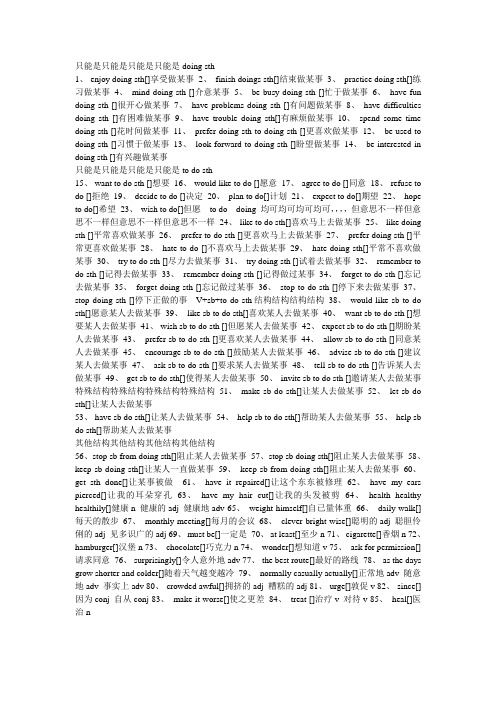
只能是只能是只能是只能是doing sth1、enjoy doing sth[]享受做某事2、finish doings sth[]结束做某事3、practice doing sth[]练习做某事4、mind doing sth []介意某事5、be busy doing sth []忙于做某事6、have fun doing sth []很开心做某事7、have problems doing sth []有问题做某事8、have difficulties doing sth []有困难做某事9、have trouble doing sth[]有麻烦做某事10、spend some time doing sth []花时间做某事11、prefer doing sth to doing sth []更喜欢做某事12、be used to doing sth []习惯于做某事13、look forward to doing sth []盼望做某事14、be interested in doing sth []有兴趣做某事只能是只能是只能是只能是to do sth15、want to do sth []想要16、would like to do []愿意17、agree to do []同意18、refuse to do []拒绝19、decide to do []决定20、plan to do[]计划21、expect to do[]期望22、hope to do[]希望23、wish to do[]但愿to do doing 均可均可均可均可,,,,但意思不一样但意思不一样但意思不一样但意思不一样24、like to do sth[]喜欢马上去做某事25、like doing sth []平常喜欢做某事26、prefer to do sth []更喜欢马上去做某事27、prefer doing sth []平常更喜欢做某事28、hate to do []不喜欢马上去做某事29、hate doing sth[]平常不喜欢做某事30、try to do sth []尽力去做某事31、try doing sth []试着去做某事32、remember to do sth []记得去做某事33、remember doing sth []记得做过某事34、forget to do sth []忘记去做某事35、forget doing sth []忘记做过某事36、stop to do sth []停下来去做某事37、stop doing sth []停下正做的事V+sb+to do sth结构结构结构结构38、would like sb to do sth[]愿意某人去做某事39、like sb to do sth[]喜欢某人去做某事40、want sb to do sth []想要某人去做某事41、wish sb to do sth []但愿某人去做某事42、expect sb to do sth []期盼某人去做某事43、prefer sb to do sth []更喜欢某人去做某事44、allow sb to do sth []同意某人去做某事45、encourage sb to do sth []鼓励某人去做某事46、advise sb to do sth []建议某人去做某事47、ask sb to do sth []要求某人去做某事48、tell sb to do sth []告诉某人去做某事49、get sb to do sth[]使得某人去做某事50、invite sb to do sth []邀请某人去做某事特殊结构特殊结构特殊结构特殊结构51、make sb do sth[]让某人去做某事52、let sb do sth[]让某人去做某事53、have sb do sth[]让某人去做某事54、help sb to do sth[]帮助某人去做某事55、help sb do sth[]帮助某人去做某事其他结构其他结构其他结构其他结构56、stop sb from doing sth[]阻止某人去做某事57、stop sb doing sth[]阻止某人去做某事58、keep sb doing sth[]让某人一直做某事59、keep sb from doing sth[]阻止某人去做某事60、get sth done[]让某事被做61、have it repaired[]让这个东东被修理62、have my ears pierced[]让我的耳朵穿孔63、have my hair cut[]让我的头发被剪64、health healthy healthily[]健康n 健康的adj 健康地adv 65、weight himself[]自已量体重66、daily walk[]每天的散步67、monthly meeting[]每月的会议68、clever bright wise[]聪明的adj 聪胆伶俐的adj 见多识广的adj 69、must be[]一定是70、at least[]至少n 71、cigarette[]香烟n 72、hamburger[]汉堡n 73、chocolate[]巧克力n 74、wonder[]想知道v 75、ask for permission[]请求同意76、surprisingly[]令人意外地adv 77、the best route[]最好的路线78、as the days grow shorter and colder[]随着天气越变越冷79、normally casually actually[]正常地adv 随意地adv 事实上adv 80、crowded awful[]拥挤的adj 糟糕的adj 81、urge[]敦促v 82、since[]因为conj 自从conj 83、make it worse[]使之更差84、treat []治疗v 对待v 85、heal[]医治n。
doing用法大全

being caught 精品资料
动名词可与介词一起构成介词短语。 A. 介词+动名词, 如: 我们得想些法子改变人们的习惯。 We’ve got to think of ways of changing people’s habits. 我向你道歉, 刚才对你那样生气。 I apologize for being so angry with you. 离开几年之后再回到你的家乡, 感觉(gǎnjué)有点怪。 After being away for several years, it is a strange experience to return to the hometown. B. 动词+介词+动名词, 如: 我坚持为这次出行带足需要的食物。 I insist on taking enough food for this trip.
精品资料
归纳: 常用-ing形式作主语的句型(jù xínɡ)有: It +be +a waste of time doing
做……是浪费时间的 It is/was no good/use doing
做……是没用处的 It is/was hardly/scarcely worth doing
做……不值得 It is/was worth/worthwhile doing
一个英语句子是由主谓宾构成的。通常情况下,主语和宾语通 常是由名称或代词充当的。当主语和宾语变成了动词,用法是 主动的必须(bìxū)用doing,被动的必须(bìxū)用being done . 也可用one’s doing 或one’s being done .否定时not必须 (bìxū)放在doing 之前。
动词搭配的doing 用法讲解
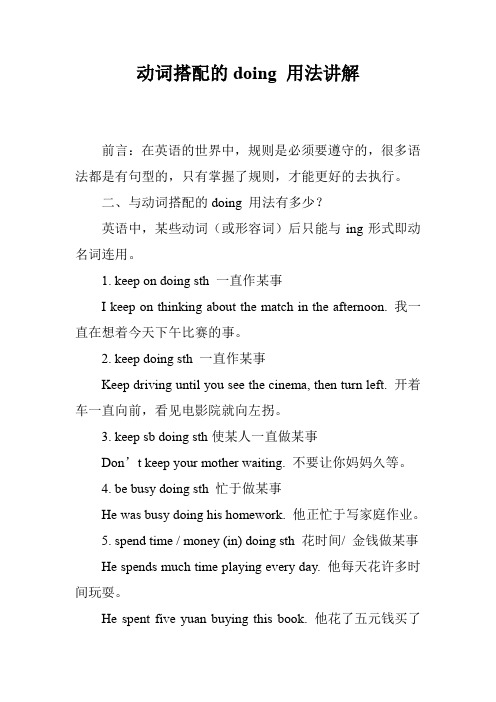
动词搭配的doing 用法讲解前言:在英语的世界中,规则是必须要遵守的,很多语法都是有句型的,只有掌握了规则,才能更好的去执行。
二、与动词搭配的doing 用法有多少?英语中,某些动词(或形容词)后只能与ing形式即动名词连用。
1. keep on doing sth 一直作某事I keep on thinking about the match in the afternoon. 我一直在想着今天下午比赛的事。
2. keep doing sth 一直作某事Keep driving until you see the cinema, then turn left. 开着车一直向前,看见电影院就向左拐。
3. keep sb doing sth使某人一直做某事Don’t keep your mother waiting. 不要让你妈妈久等。
4. be busy doing sth 忙于做某事He was busy doing his homework. 他正忙于写家庭作业。
5. spend time / money (in) doing sth 花时间/ 金钱做某事He spends much time playing every day. 他每天花许多时间玩耍。
He spent five yuan buying this book. 他花了五元钱买了这本书。
6. finish doing sth 完成某事Can you finish writing in ten minutes?你十分钟能写完吗?7. enjoy doing sth 喜欢做某事The boy enjoyed listening to music. 这个男孩喜欢听音乐。
8. mind doing sth 介意做某事Do you mind my opening the window? 你介意我开窗户吗?9. feel like doing sth 想要做某事I’m not feeling well. I don’t feel like eating. 我感觉不舒服。
doing用法大全概要
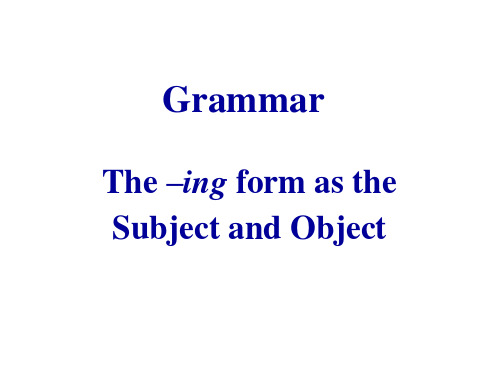
顺便记一下:
下列动词只接to do做宾语: 决心学会想希望, 拒绝设法愿假装;
主动答应选计划,同意请求帮一帮。
decide/determine, learn, want, expect/hope/wish, refuse, manage, care, pretend, offer, promise, choose, plan, agree, beg, help
have some difficulty/ trouble (in), have a good/
wonderful/ hard time (in), spend/waste time (in),等动
词词组也要用动名词做宾语。
We must try to avoid r_e_p_e_a_t_in_g_(repeat) the same
It’s no use making an excuse for this.
谈论这样无用的事情简直是浪费时间。
It’s a waste of time talking about such a useless thing. 有风的天气在海里游泳是危险的。
It’s dangerous swimming in the sea on windy days. 这个问题值得讨论。
惯)for me. 乘火车去杭州要16个小时。 Going to Hangzhou by train takes about 16 hours.
在我们国家问一个女人的年龄是不礼貌的。
Asking a woman’s age is impolite in our country.
一个英语句子是由主谓宾构成的。通常情况下,主语和宾 语通常是由名称或代词充当的。当主语和宾语变成了动 词,用法是主动的必须用doing,被动的必须用being done . 也可用one’s doing 或one’s being done .否定 时not必须放在doing 之前。
doing的用法

doing的用法
doing 是動詞 ing 形式,在英語中表示正在做某事,常見用法如下:
1. doing 后接動詞原形
常見動詞有think, try, understand, search, appreciate, consider, plan, work, shop等。
例句:
1)I’m trying to find a solution to this problem.(我正在想辦法解決這個問題。
)
2)He’s working hard to get good grades in his exams.(他正努力加油取得好
成績。
)
1)She’s been doing research for her thesis.(她一直在做論文的研究。
)
3. doing 後面也可以接介詞片語
4. 問句
What are you doing?用作問句時,doing 對應的是動詞,表示「你正在」做什么;
但是如果疑問句后接名詞或介詞片語,doing 則對應的是名詞或片語。
1)What are you doing with the computer?(你正在和電腦做什么?)。
总结归纳doing的用法

总结归纳doing的用法Doing是一个常见的英语词汇,常用于进行时态的句子中。
作为一个动名词,Doing可以帮助我们描述正在进行的动作或状态。
在本文中,我们将总结归纳Doing的用法,并且给出一些例句来帮助读者更好地理解。
一、用作主语1. 表示一般动作或状态:Doing可以用作句子的主语,表示一般的动作或状态。
例句:Doing exercise is good for health. (做运动对健康有益。
)2. 表示习惯性的动作或状态:有时,Doing也可以表示习惯性的动作或状态。
例句:Doing yoga helps me relax. (做瑜伽帮助我放松。
)二、用作动词的宾语Doing可以被一些动词后接作宾语,表示正在进行的动作。
这些动词通常是感观动词或动作动词。
例句:- I saw him doing his homework. (我看见他正在做功课。
)- She heard someone singing in the park.(她听见有人在公园里唱歌。
)三、用作介词的宾语Doing可以作为介词的宾语,表示被介词修饰的动作或状态。
例句:- She is tired of doing housework all day.(她对整天做家务感到厌烦。
)- We spent the whole afternoon doing research.(我们花了整个下午进行研究。
)四、用作形容词的宾语补足语Doing可以作为形容词的宾语补足语,用来修饰主语的状态。
例句:- She seems busy doing her project.(她看起来正在忙着做她的项目。
)- He felt satisfied with what he was doing.(他对他正在做的事情感到满意。
)五、用作动词不定式的宾语在一些特定的句型中,Doing可以作为动词不定式的宾语。
例句:- He wants to continue doing research in this field.(他想在这个领域继续进行研究。
doing的用法总结初一

doing的用法总结初一
stop to do sth. 意为“停下来(正在做的事)去做(另外的)某事”。
stop doing sth. 意为“停止做(正在做的)某事”。
remember to do sth. 意为“记住要去做某事(还没有做)”。
remember doing sth. 意为“记得(已经)做过某事”。
扩展资料
forget to do sth. 意为“忘记做某事(动作还没有发生)”
forget doing sth. 意为“忘记做过某事(动作已发生)”
例句:Don't forget to bring your photo here. 别忘了把你的相片带来。
I have forgotten giving the book to him. 我忘记我已把书给了他。
go on to do sth. 意为“做完一件事,接着做另外一件事(两件事之间可能有某种联系)”
go on doing sth. 意为“继续做下去”。
例句:After reading the text, the students went on to do the exercises. 学生们读完课文后,接着做练习。
It's raining hard, but the farmers go on working on the farm. 虽然天正下着大雨,但农民们继续在农场干活。
上一篇:下一篇:
~。
doing用法归纳总结

doing用法归纳总结Doing是动词do的现在分词形式,常用于进行时态,表示正在进行或正在进行的动作。
除了作为动词的现在分词形式外,doing还可以作为名词、形容词、副词等使用。
在本文中,我们将对doing的用法进行归纳总结。
一、动词的进行时态1. 表示正在进行的动作例如:- I am doing my homework now.(我正在做作业)- What are you doing?(你在干什么?)- They are doing the dishes in the kitchen.(他们在厨房洗碗)2. 表示习惯性的动作例如:- He is always doing his exercises in the morning.(他每天早上都做运动)- She is usually doing her shopping on weekends.(她通常在周末购物)3. 表示未来安排的动作例如:- We are going to the concert tonight. What are you doing?(今晚我们要去音乐会,你打算做什么?)- They are having a meeting tomorrow. I will be doing some research.(他们明天要开会,而我将进行一些研究工作)二、名词用法1. 表示动作或活动例如:- Swimming is my favorite doing.(游泳是我最喜欢的活动)- Reading is a good doing for relaxation.(阅读是一种很好的放松活动)2. 表示特定的事物或行为例如:- What's that doing over there?(那边那个是什么东西?)- The children's doings always amuse their parents.(孩子们的所作所为总是能逗乐他们的父母)三、形容词用法1. 表示动作正在进行中的状态或感受例如:- He had a worried look on his doing face.(他的脸上带着一副忧虑的表情)- The baby has a cute doing smile.(婴儿有一副可爱的笑容)2. 进行中的状态或情况例如:- The project is in the doing stage.(该项目正在进行阶段)- I'm sorry, but the painting is still in the doing process.(对不起,画还在制作过程中)四、副词用法1. 表示程度或强调例如:- He is doing very well in his new job.(他在新工作中表现得非常出色)- She is doing absolutely fine after the surgery.(手术后她的情况非常好)2. 表示处理或解决例如:- Let's do the problem step by doing step.(我们一步一步地来解决这个问题)- You should do it slowly, doing it carefully.(你应该慢慢来,认真地去做)总结:doing作为动词的现在分词形式,常用于进行时态,表示正在进行的动作。
非谓语doing的用法总结

非谓语doing的用法总结1. 嘿呀,非谓语 doing 可以用来表示正在进行的动作呢!就像“Hearing the news, I jumped up excitedly”,听到这个消息,我兴奋地跳了起来,“hearing”不就形象地表达出正在听的这个动作嘛!2. 哇哦,非谓语 doing 还能用于描述主词的习惯或特征呢!比如“He loves reading books in his spare time”,他闲暇时喜欢读书,“reading”多贴切地说明了他的爱好呀!3. 哎呀呀,非谓语 doing 也能充当伴随状语哦!像“She sat there, smiling happily”,她坐在那,开心地笑着,“smiling”可不是很好地伴随了她坐着的状态嘛!4. 嘿,非谓语 doing 用在固定短语中也很常见呢!“Can't help laughing when seeing this funny scene”,看到这个有趣的场景忍不住笑,这里“can't help doing”多自然呀!5. 哇,非谓语 doing 还可以表示动作的先后顺序啊!“Having fini shed his homework, he went out to play”,做完作业后,他出去玩了,“Having finished”就体现出了先做完作业这个动作呀!6. 呀,非谓语 doing 有时就像给句子增添了灵魂!就说“Looking at the sky, I feel so peaceful”,看着天空,我感觉好平静,“looking”让句子更生动了呢!7. 哈哈,非谓语 doing 的用法可真多呀!比如“The boy lying on the grass is my brother”,躺在草地上的那个男孩是我弟弟,“lying”多准确地指出了那个男孩的状态呀!我的观点结论就是:非谓语 doing 太重要啦,用法又多样,可得好好掌握呀!。
doing的特殊用法

doing的特殊⽤法⼗. doing 的其它⽤法1. 时态与语态:doing/being done / having done / having been done(1) 动名词的⼀般式表⼀般性动作,完成式表动作先于谓语之前发⽣;现在分词的⼀般式表其动作正在进⾏或与谓语动词同时发⽣,完成式表其动作发⽣在谓语动作之前。
In 1993, China used 1.2 billion tons of coal for heating and generating electricity.I’m sorry for not having kept my promise.Most doctors strongly insist on giving up smoking and taking plenty of exercise.I’m very pleased at your having been honored with a medal.I don’t remember meeting/having met you somewhere.Walking down the street , he hears someone calling him. having waited in the queue for half an Hour, the old man suddenly realized he had left the cheque in the car.(2) 主动式表其逻辑主语是doing动作的执⾏者,被动式是动作的承受者.After reading your letter I knew what had happened.Freddy and his band could not go out without being followed everywhere.Being surrounded by the students, the teacher was answering questions one by one.⼗⼀. done的其它⽤法:只有⼀种形式。
Do、To do、Doing 的用法

Do/To do/Doing 的用法1.+ to do=+ doing:开始做某事begin to do/doing =start to do / doing 不喜欢dislike to do / doing 憎恨做某事hate to do/ doing喜欢做某事like / love to do / doing2.+ to do≠+ doing:忘记去做某事forget to do忘记已经做过某事forget doing记住去做某事(未做)remember to do记得已经做过某事remember doing 继续另一件事go on to do继续做原来的事go on doing 停下来去做某事stop to do 停止做某事stop doing 努力做某事try to do试着做某事try doing悔恨没做某事regret to do 后悔已做某事regret doing3.+ do帮助做某事help (to) do宁愿(不)做某事would rather (not) do最好(不)做某事had better (not) do4.+ doing:完成做某事finish doing喜欢做某事enjoy doing一直做某事keep doing练习做某事practise doing考虑做某事consider doing坚持做某事insist on / upon doing避免做某事avoid doing建议做某事suggest doing错过做某事miss doing想象做某事imagine doing介意做某事mind doing忍不住做某事can’t help doing坚持做某事keep on/ carry on doing成功做某事succeed/ be successful in doing 忙于做某事be busy (in) doing…怎么样? What /How about doing?对做某事感兴趣be interested in doing 因某事谢谢某人thank you for doing(非常)值得被…be (well) worth doing因为…because of doing而不是instead of doing(没)有做某事without/ with doing通过做某事by doing sth担心做某事worry about doing害怕做某事be afraid of doing放弃做某事give up doing做某事有麻烦have trouble / problems /difficulty (in) doing做某事开心have fun/ a good time/enjoy oneself (in) doing浪费时间做某事lose/waste time (in) doing sth 将某人的精力投入到…put one’s effort into doing 某人花费时/钱做某事sb spend +时间/钱(in) doing梦想做某事dream of/about doing5.+to do :选择做某事choose to do拒绝做某事refuse to do需要做某事need to do=require to do迫不及待做某事can’t wait to do准备做某事prepare to do=be ready to do 计划做某事plan to do决定做某事decide to do = make a decision to do = make up one’s mind(s) to do学习learn to do继续做某事continue to do付得起做某事afford to do 似乎做某事seem to do过去常常做某事used to do敢做某事dare to do梦见做某事dream to do碰巧做某事happen to do想做某事would like to do = want to do 别无选择做某事have no choice but to do 同意做某事agree to do希望做某事hope to do希望做某事wish to do不得不做某事have to do做某事失败fail to do答应做某事promise to do逐步做某事get to do更喜欢做某事prefer to do设法做某事manage to do应该做某事ought to do主动做某事offer to do尽某人最大努力做某事try/ do one’s best to do 采取措施做某事take action(s)/steps to do 等着轮到某人做某事wait for one’s turn to do轮流做某事take one’s turn to do有机会做某事have a chance to do没有时间做某事have no time to do与…比起来宁愿做某事prefer to do rather than do =would rather do than do足够…做某事enough+n.+ to do ,adj./adv.+enough+ to do为了… to do = in order to do= so as to do=for doing6.to doing :盼望做某事look forward to doing 习惯于做某事be used to doing 致力于做某事devote …to doing 与…比起来宁愿做某事prefer doing to doing 对…做出贡献make contribution(s) to doing 导致lead to donig7. sb to do :命令某人做某事order sb to do答应某人做某事promise sb to do邀请某人做某事invite sb to do警告某人(不)做某事warn sb (not) to do请求某人(不)做某事ask sb (not ) to do吩咐某人(不)做某事tell sb (not) to do想要某人(不)做某事would like sb(not) to do 需要某人做某事need /require sb (not) to do 鼓励某人做某事encourage sb to do使用某人做某事use sth to do教某人做某事teach sb to do 导致某人做某事cause sb to do训练某人做某事train sb to do建议某人做某事advise sb to do允许某人做某事allow sb to do希望某人做某事wish sb to do让某人做木事get sb to do提醒某人做某事remind sb to do拒绝某人做某事refuse sb to do迫使某人做某事force sb to do (agree sb to do是错的,hope sb to do 是错的)8.sb doing:使某人一直做某事keep sb doing sth 介意某人做某事mind sb/ sb’s doing 阻止某人做某事prevent /stop sb (from )doing = keep sb from doing 发现某人正在做某事find sb doing9.sb do/doing看见某人做某事see sb do/ doing 观看某人做某事watch sb do/ doing 听见某人做某事hear sb do/ doing 注意某人做某事notice sb do/ doing(句中有表示时点的词用doing, 有表示频度和感情的词用do)10.sb do:使某人做某事make sb do 让某人做某事let/have sb do帮助某人做某事help sb do = help sb to do11.关于to do/doing/do的句型(1)做某事花费某人…It takes /took+sb+ 时间+ to do (2)做某事对某人而言是…的It’s + adj. for sb/ of sb to do (3)做某事对某人而言是一个遗憾It’s a pity for sb to do(4)是某人第一次做某事It’s one’s first time to do(5)到了(某人)做某事的时候了。
非谓语动词doing的用法

非谓语动词doing的用法1.作定语:现在分词可以用作定语来修饰名词或代词,表示正在进行的动作或特征。
The crying baby woke up all the neighbors.哭泣的婴儿吵醒了所有的邻居。
The boiling water scalded her hand.沸水烫伤了她的手。
2.作表语:现在分词可以用作系动词后的表语,说明主语的性质或状态。
The movie is boring.这部电影很无聊。
The food is tasting good.这食物尝起来很好吃。
3.作补语:现在分词可以用作主语或宾语补足语,补充说明主语或宾语的状态。
I found him sleeping on the couch.我发现他在沙发上睡着了。
The teacher kept the students working all day.老师让学生们忙了一整天。
4.作状语:现在分词可以用作状语,表示时间、原因、条件或伴随情况。
Reading the book, she realized the truth.读了这本书后,她意识到了真相。
Seeing from the top of the hill, the city looks beautiful.从山顶上看,这座城市很美丽。
5.独立主格结构:现在分词可以用于独立主格结构,这种结构通常由名词或代词加上现在分词构成,用作文中的插入语。
Weather permitting, we will go for a picnic.如果天气允许,我们将去野餐。
The meeting over, they all went home.会议结束后,他们都回家了。
6.作宾语补足语:现在分词可以用在某些动词后作宾语补足语,说明宾语的状况。
I saw him walking in the park. 我看见他在公园里散步。
Can you hear the birds singing? 你能听到鸟儿在唱歌吗?。
doing作状语的用法

open with a hammer.
2. We heard them _q_u_a_r_r_e_li_n_g (quarrel)
about money after the concert; they
looked very angry.
3. I heard him _d_r_o_p_p_i_n_g (drop) lots of
作伴随状语多放于句末
精选ppt
23
方式状语或结果状语 He came running back to tell me the news.
His father died, and this left the family even worse off.
His father died, leaving the family even worse off.
coins into the collecting tin.
精选ppt
14
2.有些动词词组,如:regard, describe, accept, think of, look on等之后可由as 引出V-ing形式作宾补。
They describe the cartoon as being attractive.
作伴随状语多放于句末
精选ppt
25
分词作状语时的时态和语态:
1)分词的时态:2)分词的语态
一般式: doing
done
完成式:having done having been done
1)一般式表示与谓语动词同时发生。 1. Hearing the news, he jumped with joy. 2. Surrounded by the students, the teacher
- 1、下载文档前请自行甄别文档内容的完整性,平台不提供额外的编辑、内容补充、找答案等附加服务。
- 2、"仅部分预览"的文档,不可在线预览部分如存在完整性等问题,可反馈申请退款(可完整预览的文档不适用该条件!)。
- 3、如文档侵犯您的权益,请联系客服反馈,我们会尽快为您处理(人工客服工作时间:9:00-18:30)。
The squirrel was so lucky that it just missed
_b_e_in_g__c_a_u_g_h_t_(catch).
I can hardly imagine Peter _s_a_il_in_g___(sail) across the
Atlantic.
I would appreciate your _c_a_l_li_n_g_(call) tonight.
It is/was no good/use doing 做……是没用处的
It is/was hardly/scarcely worth doing 做……不值得
It is/was worth/worthwhile doing 做……是值得的
There is no doing--无法……
There is no sense in doing 做…没有道理 There is/was no use doing 干…无意义
1)__B__ is a good form of exercise for both young and old.
A.The walk B. Walking C. To walk D. Walk
2.I find __B___more tomatoes does good to people’s health.
habits. 我向你道歉, 刚才对你那样生气。
I apologize for being so angry with you. 离开几年之后再回到你的家乡, 感觉有点怪。
After being away for several years, it is a strange
experience to return to the hometown. B. 动词+介词+动名词, 如: 我坚持为这次出行带足需要的食物。 I insist on taking enough food for this trip.
一、动词-ing形式作主语 表示经常的、习惯性的动作或状态, 谓语动词通常用单数。
如: 对年轻人和老年人来讲, 走路是一种很好的锻炼。 Walking is a good form of exercise for both young
and old. 在电视上看新闻已经成了我的一种日常习惯 Watching news on TV has become a routine(日常习
A.Exposed B. Having exposed
C. Being exposed D. After being exposed
5.__D___the meeting himself gave them a great deal of encouragement.
A.The president will attend B. The president to attend C. The president attended D. The president’s attending
The discovery of the new evidence led to the thief _b_e_in_g__c_a_u_g_h_t_(catch).
动名词可与介词一起构成介词短语。 A. 介词+动名词, 如: 我们得想些法子改变人们的习惯。
We’ve got to think of ways of changing people’s
It’s no use making an excuse for this.
谈论这样无用的事情简直是浪费时间。
It’s a waste of time talking about such a useless thing. 有风的天气在海里游泳是危险的。
It’s dangerous swimming in the sea on windy days. 这个问题值得讨论。
顺便记一下:
下列动词只接to do做宾语: 决心学会想希望, 拒绝设法愿假装;
主动答应选计划,同意请求帮一帮。
decide/determine, learn, want, expect/hope/wish, refuse, manage, care, pretend, offer, promise, choose, plan, agree, beg, help
There is/was nothing worse than doing 没有比…更糟的 There is/was no point doing 干…无意义
注意: There is no need to do sth 干……没必要, 在此句式中to do不可换为doing. 没有必要告诉她。
There is no need to tell her. 提示: 当动名词用作主语时, 其逻辑主语由 形容词性物主代词和名词所有格构成。 我姐姐病了, 使我很担心。 My sister’s being ill made me worried. 你正确未必就意味着我错了。
lost 3. ---What made you upset?
---___C___ her new bicycle.
A.As she lost B. Lost C. Losing D. Because of losing
4._C____ to sunlight for too much time will do harm to one’s skin.
have some difficulty/ trouble (in), have a good/
wonderful/ hard time (in), spend/waste time (in),等动
词词组也要用动名词做宾语。
We must try to avoid r_e_p_e_a_t_in_g_(repeat) the same
It is worthwhile discussing the question.
3. 在there be结构中作主语,构成“There is/was no doing---” 这种结构的意思相当于“It is impossible to do… ”。如: There is no hiding of evil but not to do it. 若要人不知, 除非己莫为。
2. -ing形式作主语时常后置, 此时须用it作形式主语, 用形 容词或名词作表语。常见的名词或名词短语有: no use, no good, fun, a hard / difficult job, a waste of time等; 形容词有: dangerous, worthwhile, useless等。如: 为这件事找借口是没有用的。
6.__A____the homework made his father lose his temper.
temper.
A.The boy’s not having done
B. The boy not having done
C. The boy’s having not done
D. The boy having not done
Here is no joking about such matter. 这种事开不得玩笑。
There was no knowing when he would leave. 无法知道他什么时候离开. 注意: 动名词与不定式做主语时的比较: 动名词表示的动作通常是一个泛指的动作, 不定式则常 表示具体的动作。如: 集邮是一种乐趣。
Your being right doesn’t necessarily mean my being wrong.
二、动名词用作宾语
1. 只能后接doing作宾语的动词: 考虑建议盼原谅 承认推迟没得想 避免错过继续练 否认完成就欣赏 禁止想象才冒险 不禁介意准逃亡
consider, suggest/ advise, look forward to , excuse/pardon, admit, delay/put off, fancy, avoid, miss, keep/keep on, practice, deny, finish, enjoy/ appreciate, forbid, imagine, risk, can’t help, mind, allow/permit, escape. 此外, be used to, lead to, devote to , go back to, stick to, object to, get down to, pay attention to, can’t stand, give up, feel like, insist on, thank you for, apologize for, be busy (in),
A.to eat B. eating C. eat D. eaten
2).___C___ made the student____ interest in his studies.
Being punished, to lose B. Published, lose C. Being punished, lose D. Having been punished,
mistake.
Have you considered _l_o_o_k_i_n_g_(look) for one special
friend? Do you
feel
likhea_v_in(hgave)
a
walk
with
me
after
supper?
People couldn’t help _l_a_u_g_h_in__g(laugh) funny man.
惯)for me. 乘火车去杭州要16个小时。 Going to Hangzhou by train takes about 16 hours.
